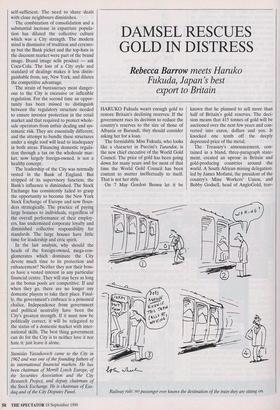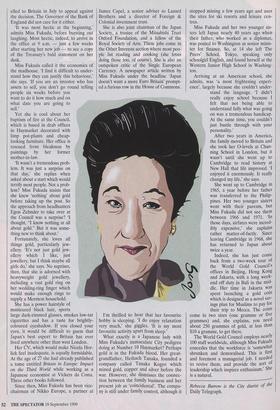DAMSEL RESCUES GOLD IN DISTRESS
Rebecca Barrow meets Haruko
Fukuda, Japan's best export to Britain
HARUKO Fukuda wears enough gold to restore Britain's declining reserves. If the government rues its decision to reduce the country's reserves to the size of those of Albania or Burundi, they should consider asking her for a loan.
The formidable Miss Fukuda, who looks like a character in Puccini's Turandot, is the new chief executive of the World Gold Council. The price of gold has been going down for many years and for most of that time the World Gold Council has been content to mutter ineffectually to itself. That is not her style.
On 7 May Gordon Brown let it be known that he planned to sell more than half of Britain's gold reserves. The deci- sion means that 415 tonnes of gold will be auctioned over the next few years and con- verted into euros, dollars and yen. It knocked one tenth off the deeply depressed price of the metal.
The Treasury's announcement, con- tained in a bland, three-paragraph state- ment, created an uproar in Britain and gold-producing countries around the world. A South African mining delegation, led by James Motlatsi, the president of the country's Mine Workers' Union, and Bobby Godsell, head of AngloGold, tray- Railway rule: no passenger ever knows the destination of the train they are sitting on. elled to Britain in July to appeal against the decision. The Governor of the Bank of England did not care for it either.
`It was most hectic at the beginning,' admits Miss Fukuda, before bursting out laughing. Most hectic, indeed, to arrive in the office at 9 a.m. — just a few weeks after starting her new job — to see a copy of the Treasury's bald statement on her desk.
Miss Fukuda called it the economics of the madhouse. 'I find it difficult to under- stand how they can justify this behaviour,' she says. 'If you are an investor who has assets to sell, you don't go round telling people six weeks before you want to do it how much and on what date you are going to sell.'
Yet she is cool about her baptism of fire at the Council, which is based in drab offices in Haymarket decorated with limp pot-plants and cheap- looking furniture. Her office is rescued from bleakness by paintings by her former mother-in-law.
`It wasn't a tremendous prob- lem. It was just a surprise on that day,' she replies when asked about a start which would terrify most people. Not a prob- lem? Miss Fukuda insists that she knew 'nothing' about gold before taking up the post. So the approach from headhunters Egon Zehnder to take over at the Council was a surprise? 'I thought, "I know nothing at all about gold." But it was some- thing new to think about.'
Fortunately, she loves all things gold, particularly jew- ellery. 'It's not just gold jew- ellery which I like, just jewellery, but I think maybe all girls do,' she says. No suprises, then, that she is adorned with heavyweight gold jewellery, including a vast gold ring on her wedding-ring finger which would make enough rings to supply a Mormon household.
She has a power hairstyle of manicured black hair, sports large dark-rimmed glasses, smokes low-tar cigarettes and has a taste for brightly- coloured eyeshadow. If you closed your eyes, it would be difficult to guess that Japan's best export to Britain has ever lived anywhere other than west London.
Her CV, which would make Nicola Hor- lick feel inadequate, is equally formidable. At the age of 27 she had already published a tome entitled Britain in Europe: Impact on the Third World while working as a Japanese economist at Vickers da Costa. Three other books followed.
Since then, Miss Fukuda has been vice- chairman of Nikko Europe, a partner at James Capel, a senior adviser to Lazard Brothers and a director of Foreign & Colonial investment trust.
She is also joint chairman of the Japan Society, a trustee of the Mitsubishi Trust Oxford Foundation, and a fellow of the Royal Society of Arts. These jobs come in the Other Interests section where most peo- ple list reading and cooking (she loves doing those too, of course). She is also an outspoken critic of the Single European Currency. A newspaper article written by Miss Fukuda under the headline 'Japan doesn't want a more Euro Britain' prompt- ed a furious row in the House of Commons.
I'm thrilled to hear that her favourite hobby is sleeping. :I do enjoy relaxation very much,' she giggles. 'It is my most favourite activity apart from sleep.'
What exactly is a Japanese lady with Miss Fukuda's immaculate City pedigree doing at Number 10 Haymarket? Perhaps gold is in the Fukuda blood. Her great- grandfather, Heihach Tanaka, founded a company called Tanaka Kogyo which mined gold, copper and silver before the war. However, she dismisses the connec- tion between the family business and her present job as 'coincidental'. The compa- ny is still under family control, although it stopped mining a few years ago and uses the sites for ski resorts and leisure cen- tres.
Miss Fukuda and her two younger sis- ters left Japan nearly 40 years ago when their father, who worked as a diplomat, was posted to Washington as senior minis- ter for finance. So, at 14 she left The Peers' School, Tokyo, speaking only schoolgirl English, and found herself at the Western Junior High School in Washing- ton.
Arriving at an American school, she admits, was 'a most frightening experi- ence', largely because she couldn't under- stand the language. 'I didn't really enjoy school because I felt that not being able to understand fully what was going on was a tremendous handicap. At the same time, you couldn't just bustle through with your personality.'
After two years in America, the family moved to Britain and she took her 0-levels at Chan- ning School in London, but it wasn't until she went up to Cambridge to read history at New Hall that life improved. 'I enjoyed it enormously. It really changed my life,' she says.
She went up to Cambridge in 1965, a year before her father was transferred to the Philip- pines. Her two younger sisters went with their parents, but Miss Fukuda did not see them between 1966 and 1971. 'In those days, airfares were incred- ibly expensive,' she explains rather matter-of-factly. Since leaving Cambridge in 1968, she has returned to Japan about twice a year.
Indeed, she has just come back from a two-week tour of the World Gold Council's offices in Beijing, Hong Kong and Jakarta, with a long week- end off duty in Bali in the mid- dle. Her time in Jakarta was spent launching a gold coin which is designed as a novel sav- ings plan for Muslims to pay for their trip to Mecca. The coins come in two sizes (one gramme or five grammes) and, she explains, you need about 250 grammes of gold, at less than $10 a gramme, to get there. The World Gold Council employs nearly 100 staff worldwide, although Miss Fukuda concedes that the workforce is 'somewhat shrunken and demoralised. This is first and foremost a managerial job. I needed to revive them, and provide the sort of leadership which inspires enthusiasm.' She is a natural.
Rebecca Barrow is the City diarist of the Daily Telegraph.



























































































 Previous page
Previous page